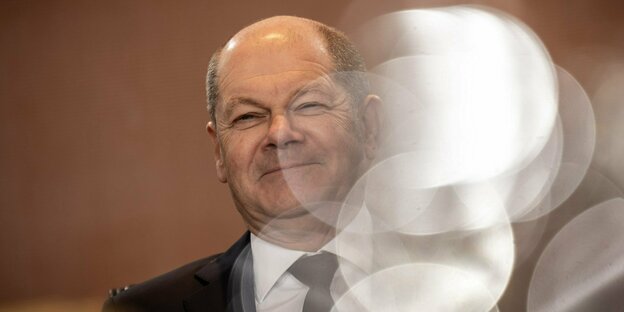There are “the voter”, “the allies” and, last but not least, Putin: it is difficult to find the right tone when it comes to arms deliveries. Also for Scholz.

Justice must be done on many sides: Scholz Photo: Michael Kappeler/dpa
This Wednesday it was good to hear what the CDU once had in Armin Laschet. That was the Union's main candidate for the 2021 federal election, now almost forgotten. In any case, Laschet, when asked this morning on Deutschlandfunk what he thought about Olaf Scholz's handling of Ukraine and the Taurus cruise missile, said: “His restraint, that he is acting very cautiously in this matter, has always seemed correct to me. war, let him think carefully about what consequences all this may have for Germany.” He even said it twice, seasoned with a pause for reflection. Balm! Someone is thinking about understanding and consideration, and about the Union!
It's not that I'm tired of high-pitched, mocking, even caustic tones. After Merkel's long years of semi-anesthesia, many will probably still have to get used to the sound of a more contentious democracy. However, when it comes to war and peace, the army and weapons, in terms of content and style, we start pretty much at the beginning, and I do not exclude this newspaper from that.
Especially since the course of the debate on Ukraine shows how demanding the task is for politicians who have to serve three audiences at the same time. There is the well-known internal scenario: “the voter.” Then there is NATO, “the allies.” And last but not least, there is Putin, who no one who cares about democracy should want to play into his hands.
The fight for credibility drives up the price
When Olaf Scholz spoke on Monday at the “editor-in-chief conference” of the dpa news agency, he clearly wanted to say something powerful. Unfortunately, he kept kneading the foam on his microphone and the automatic skylight decided to creak open. But it is still quite understandable that Scholz does not want to deliver the Taurus cruise missile to Ukraine because, unlike England and France, he has no intention of using his own soldiers for target detection, neither in Germany nor in Ukraine. This was the participation in the war that he wanted to rule out.
With this, Scholz finally publicly explained where he saw the problem with the delivery of the Taurus (demanded nationally), but on the other hand he also revealed that the British and French were more involved in the war than the world should know (annoying NATO partners). Furthermore, he had defined Germany in a way that the president of Russia could still use (Putin used).
Now all the sub-points can still be discussed, as was done in detail last week. But it's clear that the fight for credibility at home is driving up the price elsewhere. Whoever says, on the contrary, that “some of these responses would worry the population” (thanks to former Minister of the Interior Thomas de Maizière for this immortal quip of security policy) is no longer going very far in terms of internal politics.
It is no use complaining that only the German public wants every screw on every guided missile to be publicly discussed, while elsewhere state leaders simply order or ship military equipment as they see fit.

This text comes from Laborable day. Our left-wing weekly! Every week, wochentaz is about the world as it is and as it could be. A left-wing weekly with a voice, attitude and a special vision of the world. New every Saturday on newsstands and of course by subscription.
It would be strange if the democratic public demanded less transparency and stopped paying so much attention to details. However, the longer the war in Ukraine continues, the more useful it would be to recognize the communication dilemma that arises when democracy is threatened from the outside.
That's why I find the milder tones on the subject so relaxing.